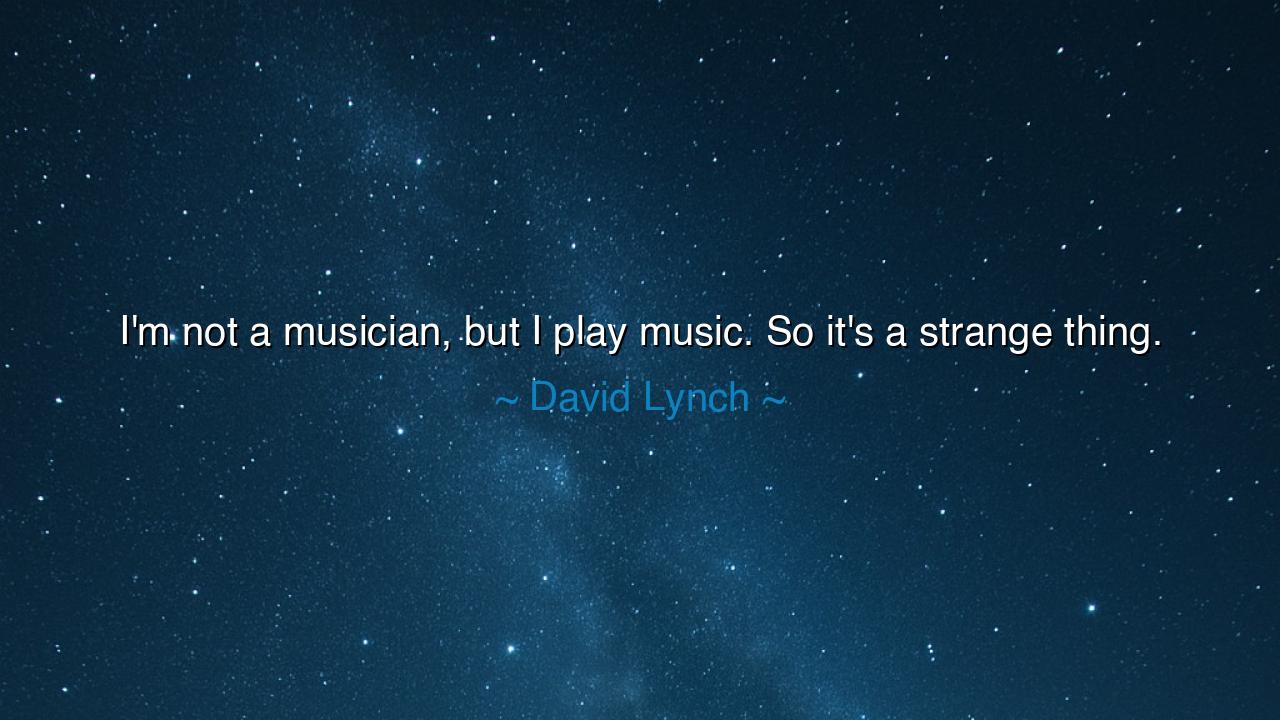
I'm not a musician, but I play music. So it's a strange thing.






“I’m not a musician, but I play music. So it’s a strange thing.” Thus spoke David Lynch, a creator who walks between worlds, weaving images and sounds into visions that bewilder and awaken. His words hold a paradox, but also a deep wisdom: that identity does not always align with action, and that art often flows not from the name we bear, but from the courage to do. To call oneself a musician is to carry a title; to play music is to embody the act. Between the two lies a mystery, where humility and expression intertwine.
The ancients would have said: “It is not the title that makes the poet, but the song.” Lynch reminds us that art belongs not to the ordained, but to the daring. One may not bear the formal training, the recognition, or the crown of mastery, yet still draw forth something true and alive. The strangeness he speaks of is the strangeness of authenticity, where a man acknowledges his limits but still dares to step into creation. Music—like painting, like speech, like prayer—is not reserved for the chosen few, but flows in every soul that dares to release it.
Consider the tale of the haiku poets of ancient Japan. Many of them were not poets by profession; they were farmers, monks, wanderers. Yet their brief verses distilled eternity into seventeen syllables, capturing lightning in words. They might never have called themselves “poets” in the grand sense, yet their lines still breathe centuries later. They, like Lynch, lived the paradox: not musicians by name, but makers of music in spirit. The title was unnecessary—the act was enough.
This truth is also found in the story of Vincent van Gogh. In his lifetime, he was not seen as an “artist” in the world’s eyes. He sold almost nothing, was mocked, dismissed, and even scorned. Yet he painted relentlessly, pouring his soul onto canvas. He might have said, “I’m not an artist, but I paint.” And history has proven that his art was real, perhaps more real than many crowned by fame. The lesson is clear: the essence of creation is not the label, but the act itself.
Lynch’s words also remind us that identity is not fixed, but fluid. To call oneself “not a musician” may be humility, or doubt, or even defiance of convention. But to say “I play music” is to embrace the act without demanding ownership of the title. In this lies liberation. When we free ourselves from the weight of identity and reputation, we enter the realm of pure creation. We no longer ask, “Am I worthy?” but instead declare, “I am doing.” This is the strange and powerful place where art flourishes.
The meaning, then, is this: do not wait for titles before you create. Do not wait for recognition before you contribute. If your soul longs to sing, then sing; if it longs to paint, then paint; if it longs to build, then build. You may not call yourself master, but mastery begins in the act. Lynch’s paradox teaches us that to create authentically, one need not first be called an artist. One becomes an artist by creating.
Practical counsel follows: silence the voice that demands a name before it allows expression. Begin where you are, with the tools you hold. If you feel unworthy, remember Lynch’s confession: the act itself is enough. Share your creations, however small, for even the untrained voice may touch hearts, even the simplest song may awaken joy. The world does not hunger for labels—it hungers for authenticity.
So remember this, O children of tomorrow: it is better to play music without being called a musician than to hold the title of musician and never play. It is the doing, not the naming, that carries power. Let Lynch’s words guide you: step boldly into creation, even if it feels strange, even if the world does not yet call you by the name. For in the act itself lies truth, and in truth lies timeless beauty.






AAdministratorAdministrator
Welcome, honored guests. Please leave a comment, we will respond soon